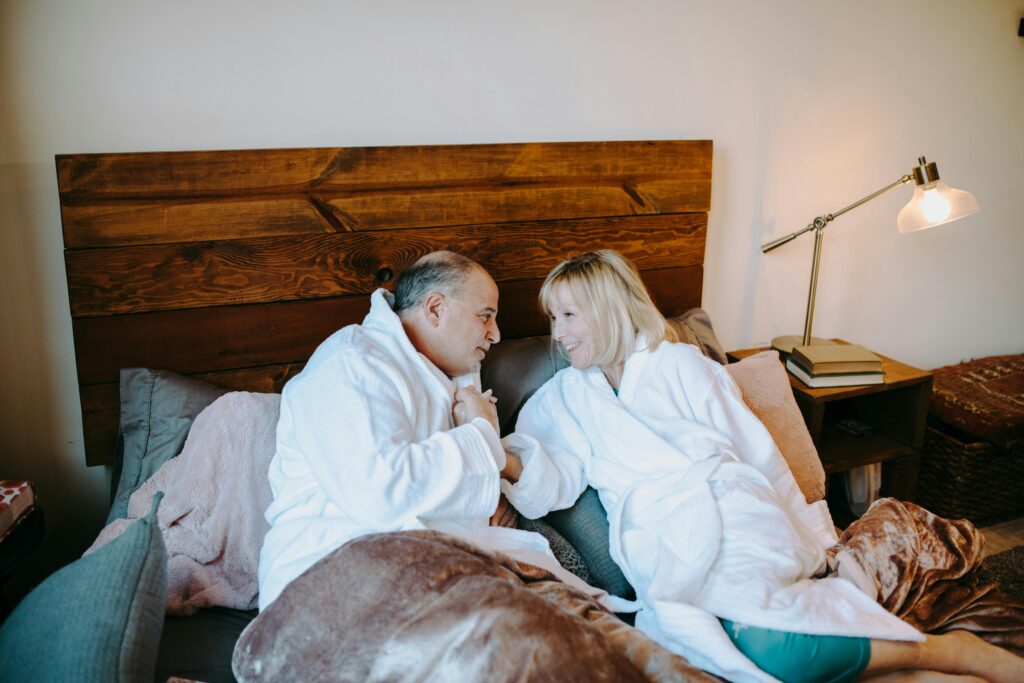In 2017, the European Court of Human Rights stepped in after a Portuguese woman, left unable to have sex by a medical procedure, received a smaller payout because a Portuguese court assumed intimacy matters less for a 50-year-old mother. The European Court disagreed completely. Physical relationships remain important throughout life, the judges ruled, regardless of age or whether someone has children. They awarded the woman proper compensation and called the lower amount discriminatory.

This ruling exposed a stereotype that even courts had accepted. We assume desire fades with age, especially for women who have had children. Our culture treats intimacy as something for the young and beautiful. Studies show that physical relationships often improve with age rather than declining. In many ways, sex gets better as we get older. So when is the best time to have sex?
Your 20s and 30s Are for Learning
When you are young, energy and curiosity help your body bounce back quickly and make intimacy feel effortless. That same abundance can cause problems. The University of Washington tracked 808 people for over 20 years and found results that challenge common assumptions. When someone first becomes sexually active, matters far less than the skills they develop later. Current relationship abilities and emotional awareness show satisfaction better than early experiences.
At these ages, people might get caught up in performance pressure. They worry about frequency, duration, and technique while comparing themselves to unrealistic standards. This anxiety prevents the learning that needs to happen.

Your 20s and 30s are when you build the tools for satisfying relationships, learning what feels good, how to ask for it, and valuing emotional connection over physical technique. For the best time to have sex, evening works well for most young couples since energy stays high and work stress fades after dinner. Weekend mornings offer another peak time when both partners feel rested and relaxed. Regular intimacy brings health benefits, lowering prostate cancer risk for men and strengthening the pelvic floor for women.
Your 40s and 50s Bring Real Confidence
Midlife brings confidence that reshapes intimacy. At this age, there is less worry about performance and more focus on pleasure. Women often feel more confident asking for what they want, and men learn that taking time usually leads to better experiences than rushing.
A life-stage study from the University of Wisconsin compared sexual satisfaction across the ages of 40 to 50. It found that while intimacy frequency drops, satisfaction does not simply fall too. Many couples discover their most creative period during these years. Without small children interrupting or demanding, careers consuming every evening, you have space to experiment.

Your body requires different approaches now, but adaptation often leads to greater satisfaction than people experienced in their younger years. For many couples, mornings work best when energy is higher, and planning beats hoping spontaneity will save the day.
Read More: Women Who Have Infrequent Sex May Face Certain Health Risks
Your 60s and Beyond: Proof Slower Can Be Better
Sex in your 70s and 80s is different from earlier years, but not worse. Physical changes mean erections may take longer, natural lubrication can fall, and stiff joints can make some positions uncomfortable, so couples may need patience and a bit of creativity. As worries about performance ease, emotional closeness often deepens. This is because sex now includes more touching, kissing, cuddling, and massages leading up to intercourse. Many couples find that this brings more pleasure and connection than they expected.

Those pleasures can also have health benefits. A study at the University of Chicago tracked 2,204 older adults and found regular sexual activity reduced cardiovascular risk, with sexually active men showing lower blood pressure and fewer heart attacks. Timing matters too, since many people have more energy in the morning and feel less affected by medications then. In later life, more time invested in foreplay often works best before sex, because what once seemed like preliminaries becomes the main event.
What Research Actually Shows About Age and Sex
Every age group benefits from regular sexual activity, but the way it helps changes over time. A large U.S. analysis of General Social Survey responses, led by Amy Muise, found sexual frequency is strongly tied to happiness, with benefits leveling off at about once a week. But satisfaction looks different at each stage. Biology helps explain those shifting priorities. Oxytocin released during intimacy builds bonds. Testosterone rises in both men and women after sex, boosting energy and mood. Endorphins offer natural pain relief as the body ages.
Each life stage also brings obstacles. Young adults struggle with performance anxiety. Middle-aged people juggle hormonal shifts and heavier responsibilities. Older adults work around health challenges and physical limits. Still, the key is adaptation, not resignation. Medical problems rarely rule out all intimacy, and depression or anxiety can be treated. Couples who keep physical connection often work through other problems more easily, creating a positive cycle where better sex supports stronger relationships.
The Real Answer
The best time to have sex depends less on our age and more on understanding what each life stage offers. Your body, mind, and circumstances create different opportunities for closeness as you age.
Your 20s and 30s are for learning your body with energy and curiosity and your 40s and 50s bring confidence and let you choose quality over quantity. In your 60s and beyond, you gain wisdom and shed many inhibitions. Part of this adaptation means working with your energy patterns. Younger couples often prefer evenings when work stress fades. Midlife brings a shift toward mornings when energy runs higher. Later years offer more flexibility as schedules open up.
Sex stays important throughout life and adapts as you do. The aim is not to match youthful performance. It is to work with your current reality. With attention and adaptation, sex can get better with age.
Read More: How Lack of Sex Can Negatively Affect Men’s Bodies: Experts Weigh In

